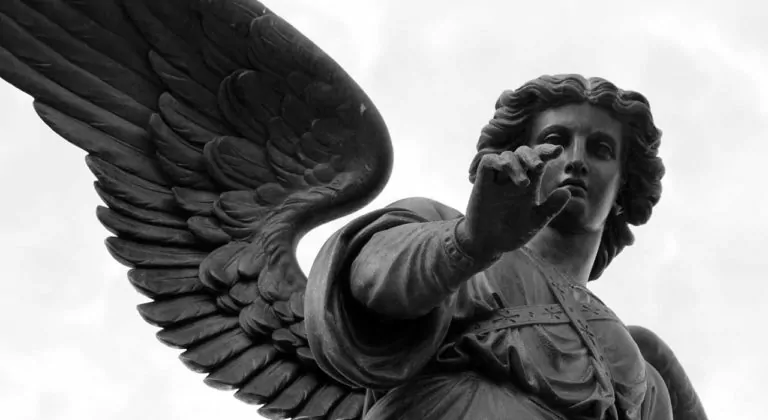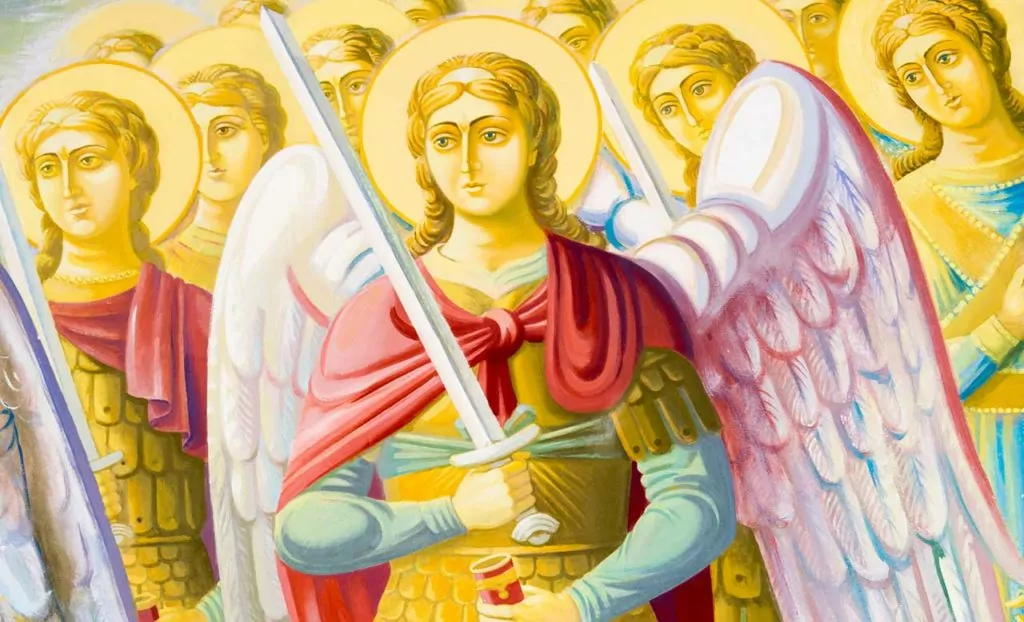Who are those mysterious angelic heavenly beings who live in the presence of the eternal, omnipotent Creator of the universe? Can we know more about them? Yes, certainly! When we carefully collect the Scriptural data, we receive a marvelous insight into the world of angels – we can learn a good deal about these wonderful beings.
Yet angelology has been frequently dismissed as futile speculation with no practical relevance for the Christian life and mission. And those who write about it at any length are said to divert believers from the weightier matters of the Christian faith. Let’s be clear: this is no indulgence into New Age escapist fascination with spiritual beings. Rather, it is to see how God is at work in His world. The task of angels is to direct us beyond them to God.
That said, it is true that undue concentration upon the angelic world does distracts us from Him. In this context, John Calvin’s rule of modesty for his treatment of angels is worth noting:
Let us remember here, as in all religious doctrine, that we ought to hold to one rule of modesty and sobriety: not to speak, or guess, or even seek to know, concerning obscure matters anything except what has been imparted to us by God’s Word. Furthermore, we ought ceaselessly to endeavor to seek out and meditate upon those things which make for edification.
Created by God
We know that the angelic world is real, not because we have verified it in experience but because God has said it. The heavenly realms in Scripture are not planets, dead stars, moon rocks or planetary rings, they are personal beings populating the universe. They are unseen spirits having different ranks, attributes and tasks. The physical as well as the spiritual world owes its origin to the Triune God. Through His Son God made the universe (Heb. 1:2). “Through him all things were made,” writes the apostle John (1:3). The apostle Paul declares the same truth, “all things in heaven and on earth, visible and invisible…were created by him (Jesus Christ) and for him” (Col. 1:16). The most extended passage on angels, Hebrews 1:5-2:9, makes a special point of establishing that our Lord is superior to them. Because they were created through Him and for Him, they belong to Him. He is their head and the center of their world.
Little is said about the origin of angels in the Bible. All that it says about the creation of angels is that “God commanded and they were created” (Ps. 148:2,5). The angelic world then is an enormous gathering of solitary, heavenly beings. They are neither male nor female. They neither marry nor are given in marriage (Mark 12:25). They don’t have offspring. Their number is complete (Matt.22%3A30&version=NASB" target="_blank" rel="noopener noreferrer">Matt.22:30). They are not eternal as they have a beginning. And they are not omnipresent as God alone is everywhere present.
Theologians have speculated when the angels were created, but not one has arrived at a definitive answer. We just don’t know. Louis Berkhof argues that no creative work preceded the creation of heaven and earth. And he states that the only safe statement seems to be that the angels were created before the seventh day. But I believe it is not too bold to argue that heaven with its inhabitants were complete at the very beginning of creation. Even before the creation of the material universe there was a vast world of angels and they still exist today. They sang praises unto God when they saw the wonder of God’s handiwork. As God said to Job, “Where were you when I laid the earth’s foundation?…On what were its footings set, or who laid its cornerstone – while the morning stars sang together and all the angels shouted for joy?”(Job 38:4-7) Angels then existed prior to man. But Man is the crown of creation (cf. Ps. 8).
The Number of Angels
Do we really need to know the exact number of angels? No, the very existence of angels testifies already to the greatness of our God.
But we can consider some of the popular notions. The Pharisees, for example, seem to have an exaggerated view of their numbers. It was said among them, “that a man, if he threw a stone over his shoulder or cast away a broken piece of pottery, asked pardon of any spirit that he might possibly have hit it so doing.”
Some medieval theologians claimed to know the exact number: one said 266,613,336, after the 133,306,668 followed Lucifer and fell; another said that there was an angel behind every blade of grass.
But the Bible does not give us definite figures. We are told that there is an enormous company of heavenly beings. Daniel 7:10 says 10,000 times 10,000 stood before the throne of God, which would amount to 100,000,000, but the point here is to speak of the vast array, rather than the particular amount. Hebrews 12:22 speaks of the city of the living God and an innumerable company of angels. We also know a great company of heavenly hosts appeared to the shepherds, praising God for the birth of the Savior (Luke 2:13). After His arrest in Gethsemane Jesus told Peter that His heavenly Father could put twelve legions of angels at His disposal. (Matt. 26:53). Again, this does not mean that Jesus said that there were literally 120,000 angels. Jesus used the number to tell Peter that He had myriads of angels who were ready to come to His aid.
Fallen Angels
So innumerable hosts of perfect angels follow their Creator. But not all angels remained faithful to Him.
Satan, the mightiest of the angels, became proud. He led a revolt in heaven and was cast out and innumerable fallen angels entered the service of the wicked Deceiver (Matt.25%3A41&version=NASB" target="_blank" rel="noopener noreferrer">Matt.25:41; 2 Cor. 12:7; Rev. 9:11; 12:7-10). Their punishment? The apostle Peter said that God did not spare His angels when they sinned “but sent them to hell” (2 Pet.2:4). Jude notes that the rebel angels “did not keep their positions of authority but abandoned their own home – these he has kept in darkness, bound with everlasting chains for judgment on the great Day” (vs. 6).
When we consider fallen angels, we can also take comfort in the presence of perfect angels. Because they were in the presence of Satan before his fall, they know the powers of the demonic better than any human being. They understand their wicked ways.
Shakespeare, the astute observer of human nature, was well aware of Satan’s pride and tempting powers. “Cromwell, I charge thee, fling away ambition; By that sin fell angels; how can man then, the image of his Maker, hope to win by it?…How wretched is that poor man that hangs on princes’ favors!… When he falls, he falls like Lucifer, never to hope again” (Henry VIII).
The evil spirits and their leader are constantly opposing the advance of the Kingdom of God. One of the greatest missionaries of all times, Ludwig Nommensen (1834-1918), settled among the Toba Bataks, in Northern Sumatra. Central to his belief was that by faith in the living Lord, Christians share in Christ’s victory over sin, death, and Satan. Nommensen was very sensitive to the reality of the spirit world. He taught fellow missionaries, “After one has come to understand the people and to be understood by them, one has to begin with the preaching of the Gospel in having a twofold work, namely to pull down the bulwark of Satan and to build up the house of truth.”
The Nature of Angels
Although there are abundant references to angels in the Bible, they are not meant to inform us about their dazzling nature. When they are mentioned, it is always in order to inform us further about God, His actions, and how He works out the plan of salvation.
What then can we say about them? They are not omnipresent. They are not restricted by time or space. Angels are without bodies and hence invisible. And although they are pure spirits, they can take on human form. We see this happening when two angels came to Lot in the form of men to tell them to get out of Sodom (Gen.19&version=NASB" target="_blank" rel="noopener noreferrer">Gen.19). Also, on the day of the resurrection, the women who went to the tomb saw two men “in clothes that gleamed like lightning” (Luke 24:4). Matthew records that an angel rolled back the stone and sat on it. His appearance was like lightning, and his clothes were white as snow (Matt.28%3A2&version=NASB" target="_blank" rel="noopener noreferrer">Matt.28:2).
Angels are endowed with great intelligence (2 Sam. 14:20). Since they are in the presence of God they have a far clearer view of and deeper insight into the meaning of all that happens in this world than we do. Our knowledge is always limited, even in our age of computers, Internet and other amazing technological advances. But angels do not act on their own; they function and intervene in the world only as God commands. Their amazing knowledge and power, like that of all other creatures, are dependent on and derived from Him. They are capable of great feats of strength, whether it is in slaying more than 180,000 in one evening, or setting an apostle free from prison (2 Kings 19:35; Acts 12).
When the Bible speaks about heaven and earth, it often links angels and human beings. Our Lord taught us to pray, “Our Father in heaven… your will be done on earth as it is in heaven”(Matt.6: 9f). The presence of angels encourages Christians to obey God. As the angels carry out God’s will in heaven so should we do the same on earth. The third request in the Lord’s Prayer means, says the Heidelberg Catechism, “Help everyone carry out (his or her work)… as willingly and faithfully as the angels in heaven”(Q&A 124).
The angels do more than sing; they also speak. Paul said to the Corinthians, “If I speak in the tongues of men and of angels, but have not love, I am only a resounding gong or a clanging cymbal” (1 Cor. 13:1). But we must not spend time in speculating about the nature of the language which angels use in communicating with one another – this is an exercise in futility. The question is, are we ready to listen when an angel addresses us? God sent an angel to prepare for Israel the way to the promised land. He told His people, “Pay attention to him and listen to what he says. Do not rebel against him”(Ex. 23:21). When an angel spoke to Zechariah the priest, and foretold the birth of John the Baptist, Zechariah did not trust his message. He said, “How can I be sure of this? I am an old man and my wife is well along in years”(Luke 1:18). There is always the tragic possibility that the voice of an angel will come to us but we refuse to listen.
Conclusion
With joy the angels obey the will of God (Ps. 103:21). Our loving God sends His angels to support His people on their often arduous journey to the heavenly city. From the throne room in heaven He commands His angels. They do His bidding. After his miraculous rescue from prison, Peter said, “Now I know without a doubt that the Lord sent his angel and rescued me from Herod’s clutches” (Acts 12:11). The angels before whom Zechariah, the virgin Mary, and the shepherd fell to the ground in fear and awe are actually our unseen helpers. As we mature in our faith, we will increasingly see the beauty and wonder of our Lord’s mighty work on our behalf, and gain in our understanding of the role of His ministering angels in our lives.
Rev. Johan Tangelder (1936-2009) wrote for Reformed Perspective for 13 years and many of his articles have been collected at Reformed Reflections.














